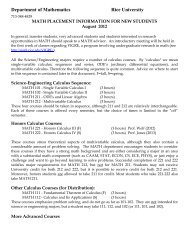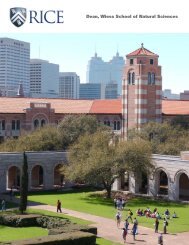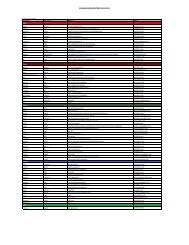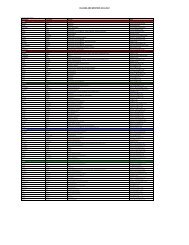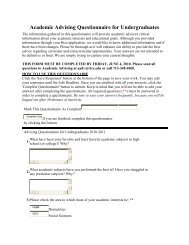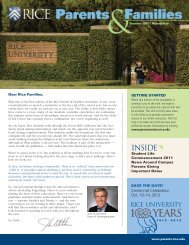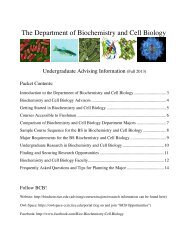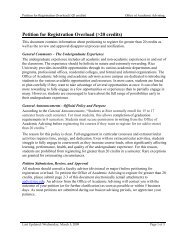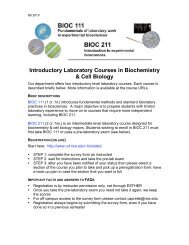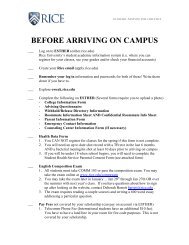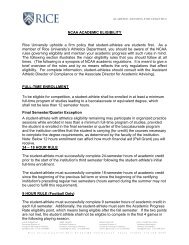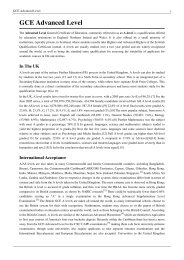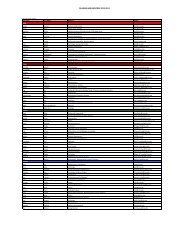Health Professions FAQs - Rice University
Health Professions FAQs - Rice University
Health Professions FAQs - Rice University
Create successful ePaper yourself
Turn your PDF publications into a flip-book with our unique Google optimized e-Paper software.
OFFICE OF ACADEMIC ADVISING<br />
<strong>Health</strong> <strong>Professions</strong> Advising<br />
also be quite helpful to seek out leadership positions. For summer opportunities, see the link under the<br />
Experience Opportunities and Scholarships page on the Office of Academic Advising website<br />
(www.rice.edu/advising). For volunteer opportunities students should explore the <strong>Rice</strong> <strong>University</strong><br />
Community Involvement Center:<br />
http://www.ruf.rice.edu/~service/programs/asb/oldasb/asb03/mex_03_app.htm<br />
Question: How do I obtain research experience?<br />
The easiest way to obtain research experience is to contact a <strong>Rice</strong> professor about volunteering in their lab<br />
or working there for course credit. Most professors have a website listing their current research. Ideally, a<br />
student should pick a lab that peaks their interest. If planning on conducting research for course credit, see<br />
the BIOC 310 website www.bioc.rice.edu/bios310. Also explore the Office of Fellowships and<br />
Undergraduate Research website for research opportunities:<br />
http://cohesiondev.rice.edu/administration/undergradresearch_dev/index.cfm.<br />
Research experience can also be obtained at the Medical Center. Read about faculty research interests at<br />
Baylor and M.D. Anderson and e-mail faculty members directly, including a resume and a request to meet<br />
and discuss their research.<br />
Question: When is a good time to start gaining clinical experience?<br />
It’s never too early to start gaining clinical experience. Clinical experience is absolutely necessary for<br />
students to learn about medicine and to show commitment to medicine as a career. Direct interaction with<br />
patients and medical personnel through work or volunteering in a hospital is preferable to simply<br />
observing clinicians as they work, but shadowing is also very helpful, and it is never too early to start.<br />
Shadowing demonstrates that the student has taken the initiative to gain first-hand experience in the field.<br />
To get the best insight, the student should shadow doctors in a variety of fields and settings. Even<br />
students with strong grades and recommendations are sometimes not admitted to medical school if they<br />
have had no contact with doctors and hospitals in the two or three year period before applying.<br />
Question: Are emergency medical services at <strong>Rice</strong> sufficient for gaining clinical experience?<br />
Emergency Medical Technicians (EMT) and Emergency Medical Services (EMS):<br />
It is natural for pre-medical students to be interested in participating in organizations related to emergency<br />
medicine and possibly becoming certified as an EMT. However, many medical schools seem to want<br />
applicants to have had contact specifically with doctors and hospitals. Emergency medical services are<br />
great supplements, but not substitutes for, contact with doctors and hospitals, at least in the eyes of some<br />
admissions committees.<br />
Question: Can I still study abroad? Is it okay to take prerequisites at an international institution?<br />
Absolutely, with careful academic planning, pre-med students can still study abroad. Students who major<br />
in science or engineering can also study abroad and successfully apply to medical school. However,<br />
having AP credit or majoring in a non-science field usually gives students more flexibility to study<br />
abroad. In most instances this type of experience will enhance your resume and will not detract from a<br />
student’s major focus. However, it is NOT recommended that students take pre-med requirements abroad.<br />
Many medical schools will not accept credits from international institutions. It is also difficult to find<br />
courses at foreign universities that fulfill exact science requirements for U. S. medical schools, and<br />
medical school admission committees usually want to see the 8 minimum premedical lab science<br />
requirements on a transcript from a U.S. college or university.



